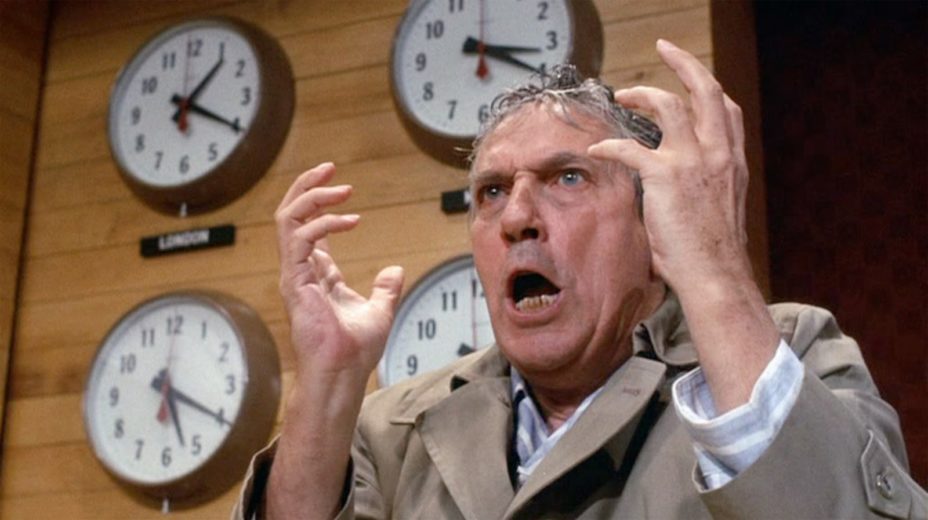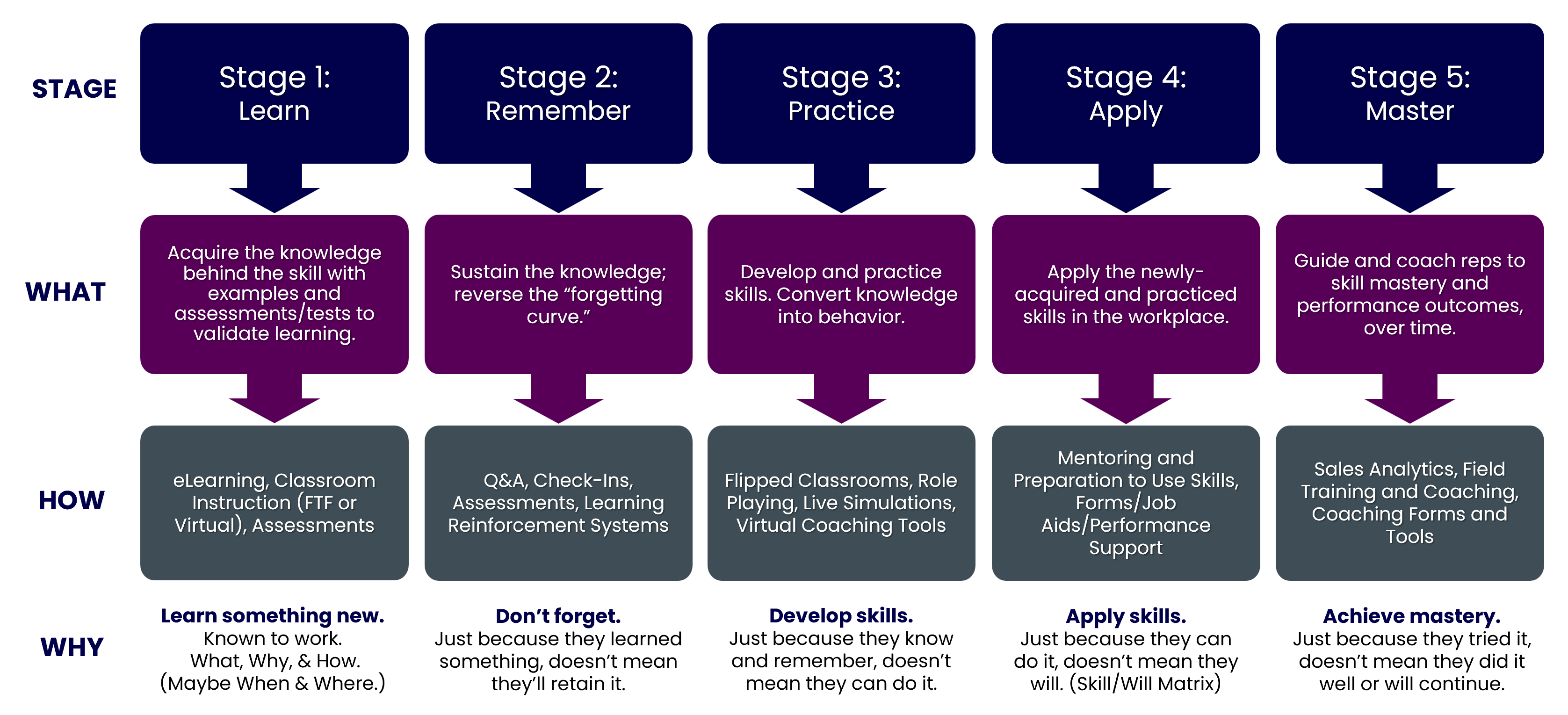Sales Leaders: It’s Time to Get Serious About Purposeful Practice & Skill Mastery

I did some counting recently. 2022 marks my 37th year in the sales profession and the 27th since my first sales training role. For the past 25 years, I’ve focused on finding holistic performance solutions that move the needle on the metrics that matter and radically improve sales mastery and performance. I’m still enjoying a great career for which I’m grateful, and based on the results I’ve delivered, I like to think I’ve had a far better than average impact for my employers and clients.
With that said, there’s something that’s been bugging me lately. I’d like to downplay it and say I’m just annoyed, but I’m afraid it’s worse than that. Some days, I feel like Peter Finch’s character in Network, Howard Beale, who urged his viewers to throw open their windows and yell, “I’m as mad as hell and I’m not going to take this anymore!”
What’s the Problem?
What’s got me going? I’m glad you asked.
There’s an overall lack of respect for deliberate practice and the current state of sales mastery is appalling.
I don’t even understand why we have this problem.
In other professions:
- There are so many parallels between sports and sales success. We hear them cited all the time. Practice is recognized as a key tenet of success in sports.
- The requirement for practice in the music profession is well-known and accepted. (Remember the old joke about how to get to Carnegie Hall? The punchline was, “Practice, practice, practice!”)
- Professional ballet dancers practice their craft for endless hours, sometimes until their feet bleed.
In business:
- Author Stephen R. Covey considered “Sharpening the Saw” to be one of his 7 habits of highly-effective people (and his book of the same title was named the most influential business book of the twentieth century).
- There are over half a dozen books on deliberate practice and its tie to achieving mastery in multiple fields, certainly including business. (See the recommended reading list at the end of this post.)
In the sales profession, specifically:
- Role play has been a part of sales training efforts for many years (albeit often designed and executed poorly).
- There are many sales enablement tools on the market today that support virtual coaching, which involves a sales rep recording themselves and submitting their video for review and feedback.
- There are even professional service companies that design role plays to assess specific competencies, record the role plays, coach the reps, and provide the recording to the reps and their managers.
Despite all of this, the lack of deliberate practice is our profession is evident. Worse, the results are equally as evident. As just one of many data points, CSO Insights cites that sales rep quota attainment is under 60 percent and on a downward trend – a clear indication that sales mastery is lacking, in general.
What’s the Solution?
It’s time to get serious about the power of purposeful practice and the sincere pursuit of sales mastery.
The Sales Education Foundation offers one potential long-term fix, through their university education programs that foster skill development, practice, role play competitions, and more. I’m honored to be a member of advisory board and to see the great work that some universities are doing in their sales curricula. The downside is that there are under 200 education programs today with a dedicated sales degree program and nearly 4,000 colleges and universities – and, I don’t think we can afford to wait until these graduates work their way into sales leadership or sales enablement roles.
We need to do something sooner (while we support these programs).
I’m not sure I have all the answers about how to influence current organizational and sales leaders to change their approach on a wide-scale level. In fact, I’d love to hear your opinions about how we can do better.
What I can do, is offer ideas about how to implement purposeful practice and create a culture that fosters sales mastery in your organization.
The Path to Purposeful Practice & Sales Mastery
There are multiple things you can do to get this started and reap the benefits. For this post, I’ll share four ideas here and focus on two for the remainder of this post:
- Doing Role Play: The first is to institute role play and practice as an expectation for your sales force. There are multiple ways to do this, and there are things you can do to radically improve the effectiveness of your role plays.
- Empower Managers: The second is to invest in your sales managers by removing the obstacles you’ve placed in their path to having time to coach, and committing to their development as sales coaches. (See this story for more detail on the potential and this sales coaching program.)
- Enable a Coaching Culture: The third is to engage your sales training or sales enablement teams to help you create a culture of practice and coaching. As part of that, you can capitalize on the available technology to make it easier. (See this eBook on Sales Coaching Excellence.)
- Guide Behavior Change and Foster Mastery: The fourth is to understand the logic of the 5 Stages of Sales Mastery & Behavior Change and use it to support your efforts to raise of level of sales mastery across your sales force. (See this eBook on Sales Training That Sticks.)
Doing Role Play Right
You don’t need advice from me on how to set an expectation. I’ll focus on how to maximize the role plays.
There is a sliding scale of how to design and run role plays effectively. Context matters.
- On one side of a sliding scale, you might have your sales reps role playing with each other and being observed by another rep (the classic role play triad: Sales Rep, Customer, Observer).
- In the middle of the sliding scale, you might have “fishbowl” role plays where a sales rep role plays with his or her manager, in front of their teammates, who all observe and provide feedback (the other reps and the manager).
- On the other far side of the scale, perhaps for a certification, your sales reps might role play with a “customer” role partner who is an executive at your company or another (someone with real experience in the role of your target persona) or a trained actor, with the observer/coach being a sales manager or other expert coaches or certifying team members.
Knowing that you will need both sides of this sliding scale and all options in-between to truly foster practice and create a practice/coaching culture, the remaining recommendations will be based on the best practices for excellence.
Include Experts
Having your reps play the customer role, and role playing with each other will help you foster practice, so you should encourage it. I once ran a branch sales office where we role played with each other every day, and made a game out of tossing customer concerns at each other during breaks and lunch, to see who could stump who. It was fun, we got very good at it, and it showed in our sales results.
But during training, during critical post-training skill development efforts, or when it’s time to certify, I recommend that you stop using other reps (or those who are on the same learning level as the rep being certified) as observers and coaches.
- When possible, use expert coaches who also understand the competencies you are assessing and how to certify or facilitate an effective role play debrief and feedback session. Peer-to-peer feedback is helpful (especially when those peers are top-producer mentors), but using expert coaches who can effectively articulate changes the rep needs to make or tactics that he/she should try, is invaluable.
- Also consider using actors, executives, or other employees who can be prepped well in advance to represent a realistic customer. I’ve done this myself and I was very impressed to learn at a past Sales Enablement Society conference that my friend and sales enablement leader, Barb Mazziotti, once hired former executives through Gerson Lehrman Group (GLG) to role play with her sales reps (she called them “real plays” – brilliant idea). Hiring actors or consultants/executives who have been in the role of your target buyers won’t always be feasible but may be worth the cost and effort for high-value simulations or especially for certifications.
- In this vein, there are companies that develop role plays for you, and train their sales coaches to play your customers realistically. Some will set up phone lines or video web conferences for your reps to call and role play with these customer/coaches. These calls and coaching sessions can be recorded, and provided back to the sales rep and their manager. The number of companies providing simulations is on the rise, too, and with advancements in VR/AR technology and AI/ML bots, we will see an increase in the coming years.
Use Realistic Customer Scenarios
If you want the reps (and managers) to buy-in and get engaged, you must develop realistic customer scenarios for the role plays. Be sure to include details that will test skills and concepts you’re trying to reinforce.
You can enable your coaches to provide great feedback by having everyone work from the same simulated scenario for at least one role play. This simulation would be designed to ensure the role play assesses the skills that were taught. This way, the coaches can become experts in the scenario content and other learners can do an aligned group debrief afterwards. It helps when everyone completely understands the context and is focused the same scenario.
After that shared experience with the simulated scenario, consider having your sales reps role play with real-deal scenarios. Working with a deal that’s in the pipeline can help the rep prepare for an upcoming customer conversation and transfer their newly-learned skills to a real-world situation.
Demonstrate Excellence
In classrooms or virtual sessions, consider doing at least one demonstration or even a “fishbowl” role play first, before everyone splits off into breakouts. (As you remember, a fishbowl is when the entire group observes one role play.) The group debrief afterward can help get everyone on the same page about expectations (what good looks like and what to avoid). Just don’t do fishbowls exclusively, unless everyone gets to play the sales rep role. If you require some reps to do it, while others sit and observe, it may be “learning” but doesn’t provide skill practice for everyone. Every rep needs to practice in the sales role to sharpen their own skills.
Allow “Re-runs” after Feedback
Want your role plays to add more value? Stop moving on to another role play other activity immediately after the role play debrief. Provide the learner the opportunity to summarize and playback the feedback, and give them time to prep and re-run the role play.
If reps can incorporate the feedback they receive soon after receiving it, they’re more likely to retain what they learned, improve their skill-level, and make a behavior change. If you develop a blended learning curriculum and flip the classroom, you will free up the time in the classroom to allow for this. I’ve seen the difference it makes firsthand. It’s worth it.
The 5 Stages of Sales Mastery & Behavior Change
This model is part of a larger Sales Training System and was designed to help organizations derive maximum benefit and ROI from sales training. The logic itself is simple. Execution is not all that difficult, either, but it does require top-down support, organizational commitment, and some planning. The benefits are tremendous.
As you can see, the stages are Learn (acquiring knowledge), Remember (purposely sustaining it), Practice (developing skills), Apply (transferring or applying those skills), and Master (achieving high levels of skill mastery over time). If you read through the Why row on the bottom, the logic should be clear. Purposeful skill practice occurs in stages 3-5, and happens both during and after training.
Use this chart (click to enlarge, if needed) to think through the possibilities and how you can better support your sales force in maximizing what they learn to improve skills and get better sales results.
That’s it for today. If you want, you too can decide to be as “mad as hell and not take this anymore!” (Even better, avoid the anger, and just take action.) If we continue to support sales education, join forces on creating opportunities for purposeful practice, and create cultures, systems, processes and tools to foster the development of sales mastery, I believe we can elevate our sales profession to heights that are greater than anticipated and produce results even better than expected.
Recommended Resources and Reading
If you want to learn more, there are plenty of resources and books on the topic:
- https://jamesclear.com/deliberate-practice-theory
- https://jasonhaaheim.com/the-deliberate-practice-book-club/
- https://www.amazon.com/Talent-Overrated-Separates-World-Class-Performers/dp/1591842948/
- https://www.amazon.com/Good-They-Cant-Ignore-You/dp/0349420211/
- https://www.amazon.com/Deep-Work-Focused-Success-Distracted/dp/1455586676/
- https://www.amazon.com/Talent-Code-Greatness-Born-Grown/dp/0099519852/
- https://www.amazon.com/Peak-Secrets-New-Science-Expertise/dp/0544947223/
- https://www.amazon.com/Art-Learning-Journey-Optimal-Performance/dp/0743277465/
- https://www.amazon.com/Practicing-Mind-Developing-Discipline-Challenge/dp/1608680908/
_______________________________________________________
As usual, this is what I think. More importantly, what do YOU think? I’d enjoy hearing your thoughts.
Thanks for reading, be safe out there, and by all means — let’s continue to elevate our sales profession.
Mike Kunkle
Get connected / follow my content:
- This blog: https://www.mikekunkle.com/blog
- My posts on the SPARXiQ Blog: https://sparxiq.com/author/mikekunkle
- My LinkedIn articles: http://bit.ly/MikeKunkleLIPublisher
- My Sales Effectiveness Straight Talk recordings: https://bit.ly/MikeKunkle-OnDemand
- My LinkedIn profile: https://www.linkedin.com/in/mikekunkle
- My Twitter profile: https://twitter.com/mike_kunkle


